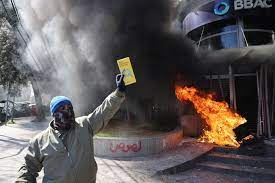Dr. Majid Rafizadeh
Lebanon is facing one of the worst financial crises in the world. It is important to understand the underlying reasons behind the crisis in order to adequately address the country’s financial meltdown and, ultimately, resolve it by tackling the root causes. How did a country once dubbed the “Switzerland of the Middle East” and whose capital Beirut was called the “Paris of the Middle East” – wind up in financial free-fall, becoming one of the most impoverished nations in the region?
The crisis did not happen over only a few years, but is the result of several decades of economic mismanagement. After the 1975-1990 civil war, the government began borrowing and accumulating debt without having a clear and credible path to pay off what it owed. Excessive borrowing continuously exceeded Lebanon’s economic growth rate. As debt grew disproportionately to the rise in gross domestic product, and as the compounding impact of interest rates made the situation more dire, Lebanon had to spend most of its revenues servicing its debt. Almost half of its earnings on average were spent on interest payments. As a result, without structural reform, it was inevitable the government would default on its debt at some point. And that is what occurred in 2020, when Lebanon defaulted on a $1.2 billion Eurobond – the first state default in the country’s history. In addition, the Lebanese pound had been pegged to the dollar at 1,500 for more than two decades, making the country partially dependent on dollar reserves. In order to attract money and fund its spending, banks began offering very high interest rates for new deposits of dollars. That started in 1993 when the central bank, Banque du Liban, which was previously led by former Merrill Lynch banker Riad Salameh, introduced the policy of “financial engineering,” offering very high returns to increase deposits of new dollars in banks.
This kind of policy might have been productive in the short term if the country quickly delivered major structural and economic reforms. But these were never carried out, and Lebanon’s debt continued to surge, becoming one of the highest in the world. The government’s debt-to-GDP ratio reached 178 percent by the end of 2019, making it the world’s third most indebted country by this measurement. Furthermore, these factors led to fewer people being willing to deposit dollars in banks, and as foreign currency inflows slowed, the pound began to lose value. The trade deficit – much higher amounts of imports in comparison to exports – also contributed to the depreciation of the Lebanese pound. Instead of addressing the underlying issues, the central bank continued to borrow more. A combination of several of these factors created a public panic, as more people rushed to withdraw their savings from banks; banks ran out of cash and shut their doors. In 2021, the Lebanese pound, officially pegged at 1,500 to the dollar, was trading at a street rate of about 23,000. Two years later, the figure was almost 100,000 to the dollar. With the economic situation worsening, Lebanese people have become increasingly disaffected with the political establishment, as they witness on a daily basis how financial mismanagement, lack of united leadership, corruption and currency devaluation have blighted their lives and living standards.
Hyperinflation and the plunging Lebanese pound have significantly affected people’s purchasing power. A report by the humanitarian research group Reliefweb in March 2023 said that “82 percent of the Lebanese population live in multidimensional poverty, while social assistance programs are almost nonexistent. Many households in the poorest areas of the country survive without electricity or heating; families lack food, which forces them to reduce their meals to two a day.” More than 1 million Lebanese children have dropped out of school since October 2019, according to the UN. And, for many people, access to electricity and the internet is becoming increasingly difficult. To compound an already volatile situation, the Beirut port blast in August 2020 – one of the largest non-nuclear explosions in history – killed over 200 people and injured thousands, destroyed several neighborhoods in the capital, and resulted in billions of dollars of damage. Lebanon needs a completely different approach and a new beginning, which means Beirut cannot continue with the same monetary and fiscal policies. The country has no other option but to deliver major structural reforms in its banking and financial system, as well as its political establishment. Ernesto Ramirez Rigo, head of the International Monetary Fund mission to Lebanon, warned that if the country’s leaders fail to carry out reforms, and keep permitting the “disorderly adjustment” of the economy to persist, Lebanon will be left dependent on handouts from the international community. “Very little investment will come to the economy and to the new sectors that Lebanon needs to develop,” he said. In a nutshell, decades of economic mismanagement have brought the “Switzerland of the Middle East” to the brink of financial meltdown, impoverishment and economic collapse. Lebanon needs a fresh start, which means delivering major structural reforms in its banking and financial system, as well as its political establishment.







